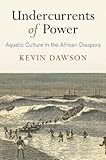Undercurrents of Power : Aquatic Culture in the African Diaspora / Kevin Dawson.
Material type: TextSeries: The Early Modern AmericasPublisher: Philadelphia : University of Pennsylvania Press, [2018]Copyright date: ©2018Description: 1 online resource (360 p.) : 29 illusContent type:
TextSeries: The Early Modern AmericasPublisher: Philadelphia : University of Pennsylvania Press, [2018]Copyright date: ©2018Description: 1 online resource (360 p.) : 29 illusContent type: - 9780812294781
- African diaspora -- History
- Africans -- America -- Ethnic identity -- History
- Aquatic sports -- Africa -- History
- Aquatic sports -- America -- History
- Boats and boating -- Africa -- History
- Boats and boating -- America -- History
- Slaves -- America -- Social conditions
- HISTORY / African American
- African Studies
- African-American Studies
- American History
- American Studies
- European History
- History
- World History
- 305.896/070903 23
- DT16.5
- online - DeGruyter
| Item type | Current library | Call number | URL | Status | Notes | Barcode | |
|---|---|---|---|---|---|---|---|
 eBook
eBook
|
Biblioteca "Angelicum" Pont. Univ. S.Tommaso d'Aquino Nuvola online | online - DeGruyter (Browse shelf(Opens below)) | Online access | Not for loan (Accesso limitato) | Accesso per gli utenti autorizzati / Access for authorized users | (dgr)9780812294781 |
Frontmatter -- Contents -- Introduction. Waterscapes of the African Diaspora -- Part I. Swimming Culture -- Chapter 1. Atlantic African Aquatic Cultures: A Cross-Cultural Comparison -- Chapter 2. Cultural Meanings of Recreational Swimming and Surfing -- Chapter 3. Aquatic Sports and Performance Rituals: Gender, Bravery, and Honor -- Chapter 4. History from Below: Enslaved Underwater Divers -- Chapter 5. Undercurrents of Power: Challenging Racial Hierarchies from Below -- Part II. Canoe Culture -- Chapter 6. African Canoe-Makers: Constructing Floating Cultures -- Chapter 7. Mountains Divide and Rivers Unite: Atlantic African Canoemen -- Chapter 8. Maritime Continuities: African Canoes on New World Waters -- Chapter 9. The Floating Economies of Slaves and Slaveholders -- Chapter 10. Sacred Vessels, Sacred Waters: The Cultural Meanings of Dugout Canoes -- Chapter 11. A World Afloat: Mobile Slave Communities -- Chapter 12. The Watermen’s Song: Canoemen’s Aural Waterscapes -- Conclusion. A Sea Change in Atlantic History -- Epilogue -- Notes -- Index -- Acknowledgements
restricted access online access with authorization star
http://purl.org/coar/access_right/c_16ec
Long before the rise of New World slavery, West Africans were adept swimmers, divers, canoe makers, and canoeists. They lived along riverbanks, near lakes, or close to the ocean. In those waterways, they became proficient in diverse maritime skills, while incorporating water and aquatics into spiritual understandings of the world. Transported to the Americas, slaves carried with them these West African skills and cultural values. Indeed, according to Kevin Dawson's examination of water culture in the African diaspora, the aquatic abilities of people of African descent often surpassed those of Europeans and their descendants from the age of discovery until well into the nineteenth century.As Dawson argues, histories of slavery have largely chronicled the fields of the New World, whether tobacco, sugar, indigo, rice, or cotton. However, most plantations were located near waterways to facilitate the transportation of goods to market, and large numbers of agricultural slaves had ready access to water in which to sustain their abilities and interests. Swimming and canoeing provided respite from the monotony of agricultural bondage and brief moments of bodily privacy. In some instances, enslaved laborers exchanged their aquatic expertise for unique privileges, including wages, opportunities to work free of direct white supervision, and even in rare circumstances, freedom.Dawson builds his analysis around a discussion of African traditions and the ways in which similar traditions—swimming, diving, boat making, even surfing—emerged within African diasporic communities. Undercurrents of Power not only chronicles the experiences of enslaved maritime workers, but also traverses the waters of the Atlantic repeatedly to trace and untangle cultural and social traditions.
Mode of access: Internet via World Wide Web.
In English.
Description based on online resource; title from PDF title page (publisher's Web site, viewed 24. Aug 2021)


